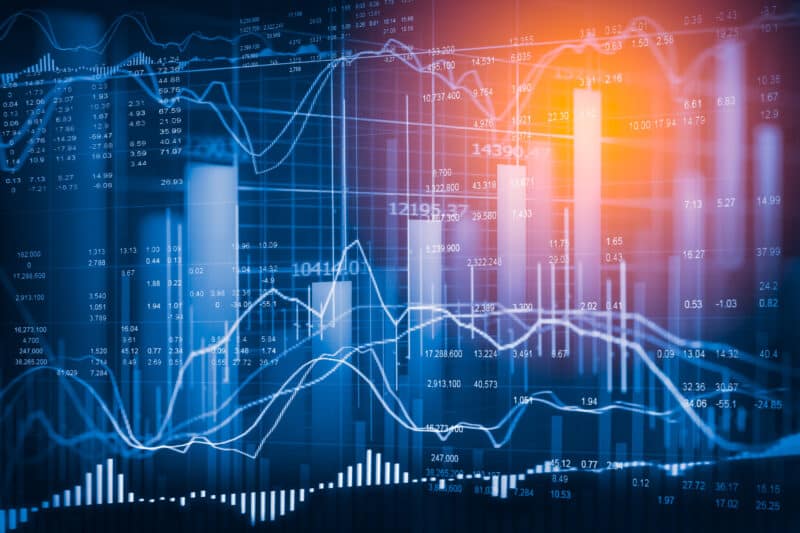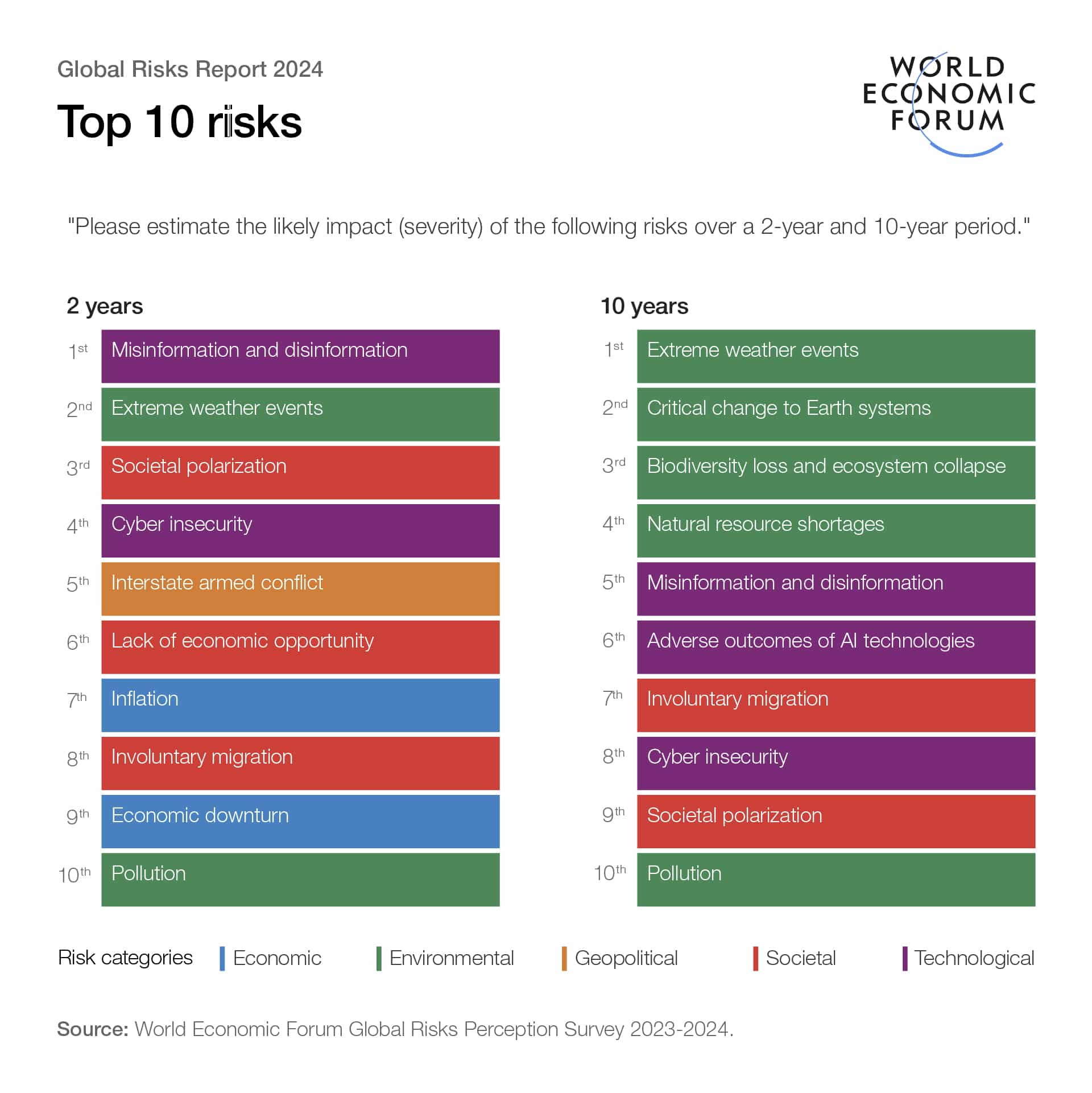- Misinformation is the biggest short-term threat, while extreme weather events and critical changes in Earth’s systems are the key long-term challenges.
- Two thirds of global experts predict that a multipolar and fragmented world order will form over the next decade.
- The report highlights that global cooperation on urgent issues may prove insufficient, necessitating a change in approach and new solutions.
The latest edition of the Global Risks Report, developed by the World Economic Forum, warns of a global threat landscape where progress in human development being gradually curtailed, leaving both states and individuals vulnerable to new and resurgent threats. Amidst systemic changes in power, climate, technology and demographics, global threats will reduce the world’s adaptive capacity.
The authors of the report point out that current international cooperation on burning issues may be inadequate, leading to the need for a change in approach to threat issues. Two thirds of global experts foresee a multipolar or fragmented world order forming over the next decade, where medium and great powers will compete and establish and enforce new rules and norms.
The report, developed in collaboration with Marsh McLennan and Zurich Insurance Group, is based on the analysis of the opinions of over 1,400 global risk experts, decision-makers and industry leaders. The results of the survey conducted in September 2023 point to negative visions for the world in the short term, which are expected to worsen over a longer period. While 30% of experts expect an increased risk of global disasters within two years, nearly two-thirds predict it will grow over the next 10 years.
“An unstable world order, marked by polarizing narratives and a lack of security, the effects of extreme weather conditions and economic uncertainty are accelerating the spread of threats – including misinformation. World leaders must jointly confront short-term crises and build a more resilient, balanced and inclusive future, ” sums up the report’s findings Saadia Zahidi, Managing Director, World Economic Forum.
Increase in misinformation and conflicts
Worries associated with the ongoing cost of living crisis and threats related to misinformation based on artificial intelligence and societal polarization dominated the 2024 risk forecast. False information combined with social unrest will be at the centre of attention due to the upcoming elections in several major economies. Inter-state armed conflicts will be one of the five biggest challenges over the next two years. Current geopolitical tensions undermining social resilience will cause further spread of conflicts.
Economic uncertainty and slowdown of development
The upcoming years will be marked by continuing economic uncertainty and widening gaps in economic and technological development. Limited economic opportunities rank sixth in the ranking of threats in the two-year perspective. In the longer term, economic barriers may intensify, causing large segments of the population to be cut off from economic opportunities. Countries exposed to conflict or vulnerable to climate threats may be increasingly isolated from investment, technology and related jobs. Without access to secure means of livelihood, individuals will be more susceptible to crime, militarization or radicalization.
Planet in danger
Environmental threats continue to dominate the risk landscape across all time frames. Two-thirds of global experts fear extreme weather events in 2024. Extreme weather events, critical changes in Earth’s systems, loss of biodiversity and ecosystem collapse, shortages of natural resources and environmental pollution make up five of the 10 most serious threats we will face over the next decade. but experts disagree on the urgency of these threats – e.g., respondents from the private sector believe that most environmental risks will materialize over a longer period of time.
Response to threats
The report calls on leaders to rethink actions aimed at counteracting global threats. The authors of the publication recommend focusing global cooperation on quickly building barriers to the most harmful risks, through e.g. creating agreements on the inclusion of artificial intelligence in the decision-making process in conflicts. The report also analyzes other types of actions, such as strengthening the resilience of individuals and states through educational campaigns focused on acquiring digital skills in the area of misinformation, as well as support and promotion of research in the field of climate modeling and technologies that will accelerate energy transformation, with the joint participation of the public and private sectors.
Artur Grześkowiak – President of Marsh Poland, Co-CEO Marsh McLennan in the CEE Region emphasizes: “Economically, the most important threats to business dominate globally, including: deterioration of the economic situation, inflation, shortage of workforce and/or talents, disruption of energy supplies and public debt. Among the five key risks in Poland were: inflation, deterioration of the economic situation (e.g. recession, stagnation), inter-state armed conflict, accidental or intentional use of biological, chemical or nuclear weapons, and public debt. It is also worth paying attention to long-term risks (over the next 10 years), which focus on: climate (the need to mitigate change, use geoengineering solutions); advanced technologies (regulation, use of artificial intelligence, inequalities related to the use of technological advantage by some countries); the labor market (challenges related to structural change – demand for skills and meeting new needs, discrepancies in job transfer and retraining as a result of artificial intelligence implementation), wave of crime (black market operations, cyberattacks, business models based on cryptocurrencies and money laundering possibilities, challenges related to corruption, state crime and relationships among terrorist / criminal groups leaders of political regimes)”.
Carolina Klint, Chief Commercial Officer, Europe, Marsh McLennan comments: “The breakthrough in artificial intelligence has radically changed the risk perspective for organizations, many of which struggle with threats stemming from misinformation, disintermediation, and strategic miscalculations. At the same time, companies need to redefine supply chains, which are becoming increasingly complicated due to geopolitics, climate change and cyber threats from an increasing number of malicious actors. Navigating this rapidly changing risk landscape will require constant focus on building resilience at the organization, national and international level, and closer cooperation between the public and private sectors.”
” The world is experiencing significant transformations due to artificial intelligence, climate change, geopolitical shifts, and demographic changes. Known risks intensify and new ones appear, which also create opportunities. Joint and coordinated action on the international stage plays an important role, but local strategies are key to mitigating the impact of global threats. Individual actions by citizens, companies and countries can contribute to reducing global risk, creating a more optimistic and safe world” – adds John Scott, Head of Sustainability Risk, Zurich Insurance Group.
Marcin Zimowski, Director of the Marsh Office in Poznań, Leader of the Wind Energy Practice, adds “In last year’s report, the attention of experts was mainly focused on environmental risks – as many as five out of ten of the most important threats were related to this area. This year, these challenges were overshadowed by dangers associated with the development of new technologies and the world’s economic situation. This does not mean that traditional threats posed by nature have become less important. The risk of extreme weather events is the second among short-term threats and has moved up to number one in a long-term perspective. Experts point out the dominant role of broadly defined environmental risks over the next 10 years – they occupy the first four places in the ranking of threats (as in the previous year) and make up half of the first ten in this list. It is worth adding that in this edition of the report, environmental pollution was mentioned for the first time as one of the key sources of risk in the near and more distant future”.
Krzysztof Nowak, President of Mercer Poland, summarizes key social challenges: “The pension system in Poland struggles with negative demographic phenomena and low pension levels, especially for women. The Polish labor market still has a low employment activity of people over 50 years old. Additionally, the level of wages is a major problem for Polish workers and employers who need to handle wage pressure while maintaining competitiveness. An increasing labor force deficit is also felt, especially in sectors requiring high levels of education and talent, such as the IT and BPO industries. The key challenge in the near future will also be the implementation of the Pay Transparency Directive, which will significantly change employee relations in Poland. At the same time, high inflation in our country generates threats that will help cause income differentiation and deepen social differences”.
Małgorzata Splett, FINPRO & Cyber Leader in the CEE Region, Marsh: “Challenges related to cyber security remain unchanged in the forefront of threats indicated in this year’s Global Risks Report. The increasingly widespread use of artificial intelligence (AI) systems is gaining popularity, which creates opportunities and threats. On one hand, artificial intelligence can support and develop modern cyber security, on the other, hackers can use it for their own purposes. This trend will positively influence the market for cyber insurance, which is already growing quite dynamically. This trend will be strengthened by the more favorable prices of cyber policies, the greater capacity available on the market and the offered extensions of insurance protection”.

